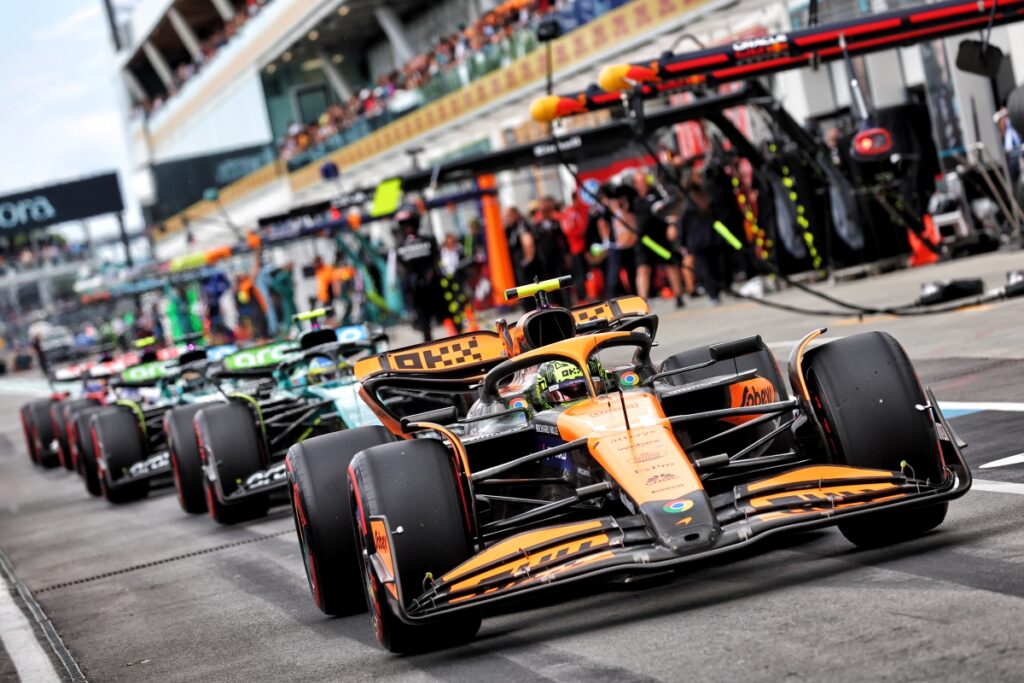Lando Norris Sounds Alarm: Why the 2026 F1 Regulations Could Shatter Competitive Racing

Lando Norris has sent shockwaves through the Formula 1 community by cautioning that the sport may no longer experience thrillingly tight qualifying sessions, akin to those recently witnessed in events like the Canadian Grand Prix, once the 2026 regulations come into effect. The FIA has just rolled out a blueprint for F1's next era, which includes a transition to lighter and smaller cars, promising to enhance the racing spectacle. However, while the spotlight has primarily been on whether the FIA's lofty ambitions with these new regulations are feasible, Norris has raised an entirely different concern: the potential loss of competitiveness.
Last weekend's Q3 stage in Montreal was a testament to the current thrill of F1 racing, showcasing a neck-and-neck battle between George Russell and Max Verstappen for pole position, with less than three-tenths of a second separating the top seven qualifiers. Norris points out that such nail-bitingly close margins are unlikely to persist in the initial years following the regulatory overhaul. According to him, every significant change in regulations tends to lead to a period where the field is more spread out, disrupting the competitive balance just as teams start to converge under the existing rules.
Reflecting on historical precedent, Norris remarked, “I think you're not going to have days like today again. You're not going to have days like the last few weeks probably in '26, '27, '28, or pretty much like '28, '29. So, it's how it's always been. Every time there's a regulation change, there's big gaps.” This concern is echoed by many in the paddock who remember how the field spread apart during previous rule shifts, only to gradually come closer again as teams optimized their new setups.

Norris isn't just speculating; he’s basing his cautionary outlook on a pattern observed over several regulation periods. “Red Bull had their time, and now it seems like we've been able to catch up. So just as we're getting there, and I think probably looking ahead to next year already, next year should be an exciting year for everyone, just from first to last,” he explained. Sadly, this progression towards a more competitive field may be short-lived with the 2026 rule changes on the horizon.
The McLaren driver also emphasized the complexity involved in deciding whether to stick with current regulations or adopt new ones. He pointed out that while there could be some benefits to racing under the new rules, there may also be significant drawbacks. “The type of racing you're going to get is probably quite different,” he said. “So, it's complicated. It's not a simple answer. I don’t know the answer, at the same time. I don’t think anyone knows exactly how it's going to pan out.” This uncertainty has left many fans and team principals scratching their heads about the future of F1.
Norris did acknowledge that at the tail end of regulation cycles, the competition has proven to be more thrilling. “Always at the end of these regulation changes, we see days like today and we see closer battles—and now Mercedes up here as well. So that's four teams who are fighting towards the top. [That] is eight cars, you’re going to see different winners. And I think that’s exciting for people watching.” This balanced competition among top teams like Mercedes, Red Bull, and others has indeed reinvigorated the sport and kept viewers on the edge of their seats.
Yet, he believes that this excitement is at risk. “But definitely, you're not going to have that in '26,” Norris reiterated. The impending regulation shifts bring F1 to a crossroads, where the sport must decide whether to keep the current set of rules—promoting closer battles and greater unpredictability—or to shake things up with new regulations that could set the field back and prolong periods of dominance by a select few teams.
Ultimately, Norris' comments serve as a critical look at the potential unintended consequences of the 2026 F1 regulations. As teams and fans eagerly await how these changes will unfold, one thing remains clear: The decisions made now will significantly impact the sport's competitive landscape for years to come.